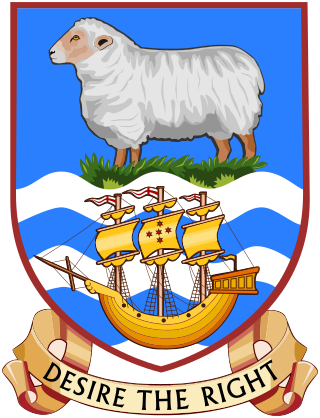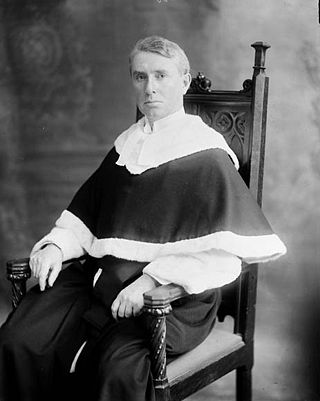The Attorney General of Rivers State is an appointed official in the executive branch of the Government of Rivers State. The Attorney General is appointed by the Governor, with the consent of the Rivers State House of Assembly. The Attorney General serves as the Commissioner of Justice and chief law officer of the state. Some of the duties assigned to this official include supervising the law, administering the state's legal system and advising the government on legal matters.
The post of the Attorney General is described in Chapter VI, section 195 of the Constitution as follows:
(1)There shall be an Attorney-General for each State who shall be the Chief Law Officer of the State and Commissioner for Justice of the Government of that State. (2) A person shall not be qualified to hold or perform the functions of the office of the Attorney-General of a State unless he is qualified to practise as a legal practitioner in Nigeria and has been so qualified for not less than ten years. [1]
Section 211 of the Constitution provides that "the attorney general of a state shall have power":

The politics of the Falkland Islands takes place in a framework of a constitutional monarchy and parliamentary representative democratic dependency as set out by the constitution, whereby the Governor exercises the duties of head of state in the absence of the monarch and the Chief Executive is the head of the Civil Service, with an elected Legislative Assembly to propose new laws, national policy, approve finance and hold the executive to account.
In most common law jurisdictions, the attorney general or attorney-general is the main legal advisor to the government. In some jurisdictions, attorneys general also have executive responsibility for law enforcement, prosecutions or even responsibility for legal affairs generally. In practice, the extent to which the attorney general personally provides legal advice to the government varies between jurisdictions, and even between individual office-holders within the same jurisdiction, often depending on the level and nature of the office-holder's prior legal experience.

A justice of the peace (JP) is a judicial officer of a lower court, elected or appointed by means of a commission to keep the peace. In past centuries the term commissioner of the peace was often used with the same meaning. Depending on the jurisdiction, such justices dispense summary justice or merely deal with local administrative applications in common law jurisdictions. Justices of the peace are appointed or elected from the citizens of the jurisdiction in which they serve, and are usually not required to have any formal legal education in order to qualify for the office. Some jurisdictions have varying forms of training for JPs.

The term magistrate is used in a variety of systems of governments and laws to refer to a civilian officer who administers the law. In ancient Rome, a magistratus was one of the highest ranking government officers, and possessed both judicial and executive powers. In other parts of the world, such as China, magistrate is a word applied to a person responsible for administration over a particular geographic area. Today, in some jurisdictions, a magistrate is a judicial officer who hears cases in a lower court, and typically deals with more minor or preliminary matters. In other jurisdictions, magistrates are typically trained volunteers appointed to deal with criminal and civil matters in their local areas.

A prosecutor is a legal representative of the prosecution in states with either the adversarial system, which is adopted in common law, or inquisitorial system, which is adopted in civil law. The prosecution is the legal party responsible for presenting the case in a criminal trial against the defendant, an individual accused of breaking the law. Typically, the prosecutor represents the state or the government in the case brought against the accused person.
Chapter 7: Executive Government.Chapter 7 of the 1997 Constitution is titled Executive Government. There are five Parts, further subdivided into thirty sections, which set out the organization, functions, and responsibilities of the executive branch of government. Modeled on the Westminster system, Fiji's constitution does not separate the Executive and Legislative branches of government as strictly as do many democracies, but despite considerable overlap, the branches of government are nevertheless constitutionally distinct.

The Constitution of the State of Tennessee defines the form, structure, activities, character, and fundamental rules of the U.S. State of Tennessee.
The Constitution of the State of New Hampshire is the fundamental law of the State of New Hampshire, with which all statute laws must comply. The constitution became effective June 2, 1784, when it replaced the state's constitution of 1776.

Parliament of Sierra Leone is the legislative branch of the government of Sierra Leone. It is principally responsible for making laws. The Sierra Leone parliament consists of 149 members, of which 135 members are directly elected from across Sierra Leone's 16 districts, while 14 are paramount chiefs appointed from the 14 rural districts. The parliament is led by the Speaker of the House; the position is currently held by Abass Bundu of the Sierra Leone People's Party. The current elected 135 ordinary members of parliament are composed of members of the All People's Congress and the Sierra Leone People's Party which are the two largest political parties in Sierra Leone.

The Attorney General of Malaysia is the principal legal adviser of Malaysia. The Attorney General is also the highest ranking public prosecutor in the country and is also known as the Public Prosecutor, or simply PP. The powers with regard to prosecution is contained in Article 145(3) of the Federal Constitution. For instance, exercisable at his discretion, the Attorney General may institute, conduct or discontinue any proceedings for an offence, other than proceedings before a Syariah court, a native court or a court-martial.

The government of the U.S. State of Oklahoma, established by the Oklahoma Constitution, is a republican democracy modeled after the federal government of the United States. The state government has three branches: the executive, legislative, and judicial. Through a system of separation of powers or "checks and balances," each of these branches has some authority to act on its own, some authority to regulate the other two branches, and has some of its own authority, in turn, regulated by the other branches.

The judicial officers of the Republic of Singapore work in the Supreme Court and the State Courts to hear and determine disputes between litigants in civil cases and, in criminal matters, to determine the liability of accused persons and their sentences if they are convicted.
The government of Virginia combines the executive, legislative and judicial branches of authority in the Commonwealth of Virginia. The current governor of Virginia is Glenn Youngkin. The State Capitol building in Richmond was designed by Thomas Jefferson, and the cornerstone was laid by Governor Patrick Henry in 1785. Virginia currently functions under the 1971 Constitution of Virginia. It is Virginia's seventh constitution. Under the Constitution, the government is composed of three branches: the legislative, the executive and the judicial.

The Office of the Solicitor General of the Philippines, formerly known as the Bureau of Justice, is an independent and autonomous office attached to the Department of Justice. The OSG is headed by Menardo Guevarra.

The Falkland Islands Constitution is a predominantly codified constitution documented primarily within the Falkland Islands Constitution Order 2008, a statutory instrument of the United Kingdom. The constitution, in its present form, was made on 5 November 2008 by Queen Elizabeth II in a meeting of the Privy Council at Buckingham Palace. It was laid before Parliament on 12 November 2008 and came into force on 1 January 2009, replacing the 1985 constitution.

The Constitution of Barbados is the supreme law under which Barbados is governed. The Constitution provides a legal establishment of the Government of Barbados, as well as legal rights and responsibilities of the public and various other government officers. The Constitution which came into force in 1966 was amended in 1974, 1980, 1981, 1985, 1989, 1990, 1992, 1995, 2000, 2002, 2003, 2005, 2007, 2009, 2010, 2018, 2019, 2020 and 2021. The 1966 document succeeds several other documents concerning administration of Barbados. One of them, the Barbados Charter, is discussed in the present Constitution's Preamble. Prior statutes were created for the administration of Barbados as a colony. As a former English and later British colony, the Constitution is similar to those of other former Commonwealth realms, yet distinctly different in the spirit of the Statute of Westminster.

The Supreme Court of Mauritius is the highest court of Mauritius and the final court of appeal in the Mauritian judicial system. It was established in its current form in 1850, replacing the Cour d'Appel established in 1808 during the French administration and has a permanent seat in Port Louis. There is a right of appeal from the Supreme Court of Mauritius directly to the Judicial Committee of the Privy Council in London. The Judicial Committee of the Privy Council (JCPC) is the court of final appeal for Mauritius.
The Attorney-General of the Turks and Caicos Islands is the legal adviser to the Government and House of Assembly of the Turks and Caicos Islands. Previously administered indirectly via Bermuda, Jamaica and the Bahamas, the islands received their own governor and became a separate autonomous British Overseas Territory when Bahamas became independent in 1973.
The Attorney General of Lagos State also known as Lagos State Commissioner for Justice is the head of the Lagos State Ministry of Justice. The officer's duty is to ensure that "the laws of the state are uniformly and adequately enforced". The Attorney General carries out the responsibilities of the office through the Ministry of Justice. The Attorney General is appointed to a four-years term, with a maximum of two terms, by the Governor subject to the approval of the State House of Assembly. The incumbent Attorney General is Lawal Pedro appointed on 13 September 2023.
The governor of Imo State is an elective political position, one of the governors of the thirty-six states of Nigeria. The governor of Imo State is the chief executive officer of Imo state and its executive branch with the assistance of the deputy governor. Fourteen people have served as governor since Imo State was created in 1976: eight military governors, two military administrators and seven democratic governors. The current governor is Hope Uzodinma of the All Progressives Congress, in office since 15 January 2020.